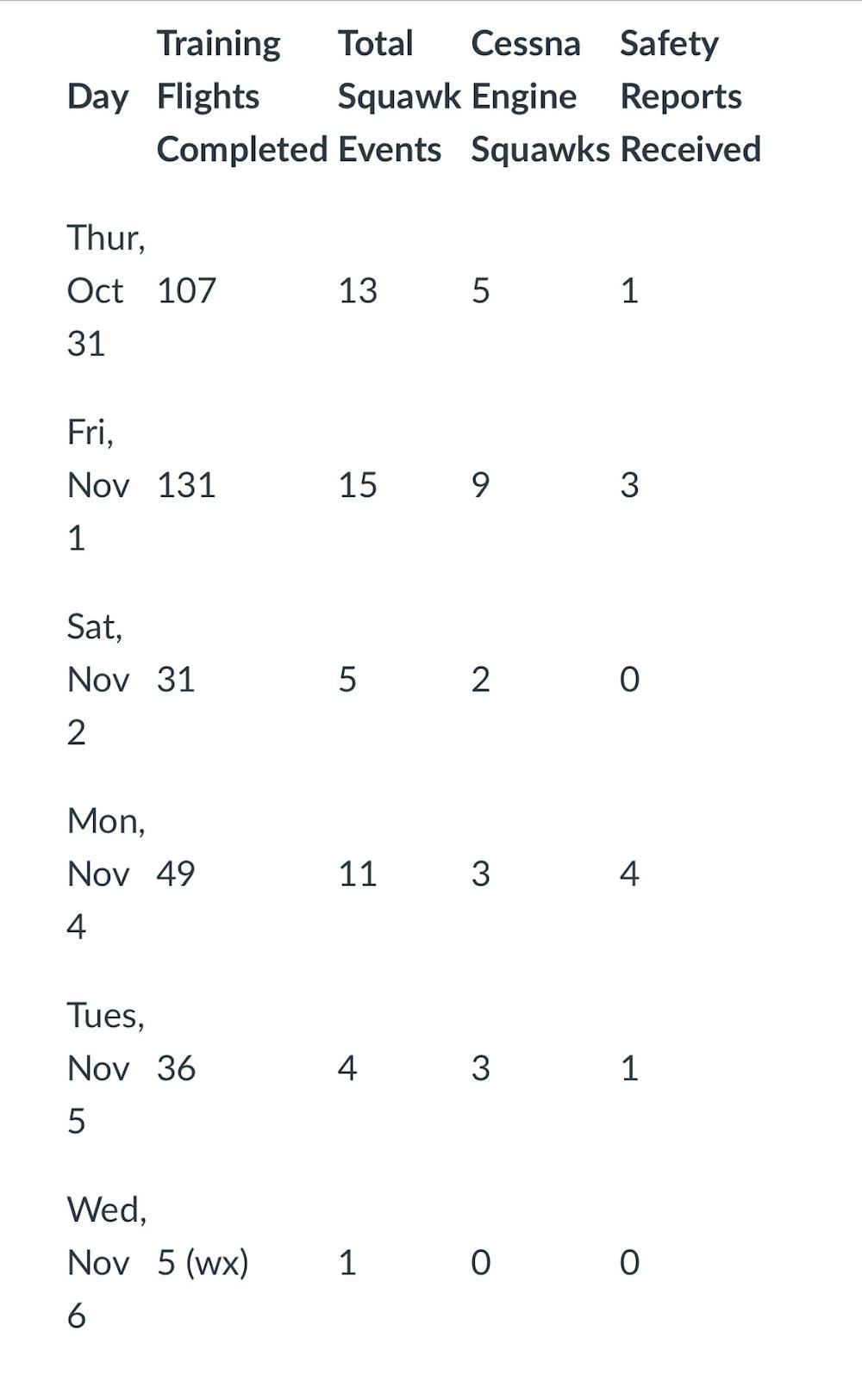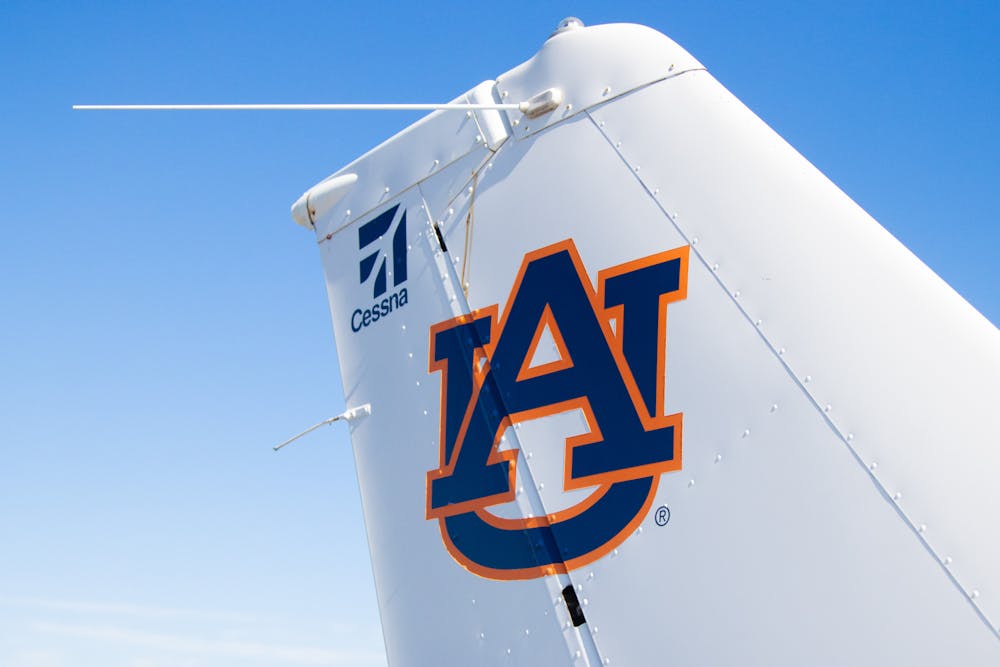Throughout the fall 2024 semester, Auburn University's School of Aviation has grounded numerous Cessna 172 airplanes citing safety concerns. Professional flight students studying for their private pilot certificate, instrument rating or a majority of their commercial pilot certificate have largely been unable to progress their training since then.
Students, parents and flight instructors continue to express concerns over safety, course completion and academic standing as the School of Aviation is still working on handling the situation. The school, which had 880 students in the fall 2023 semester, now has 1,033 students enrolled.
James Birdsong, interim director of the School of Aviation, expressed the school’s focus on continuously maintaining the planes, especially after the school has reached higher numbers in enrollment. He has also sent multiple safety status updates and other information to students through the learning-management system, Canvas, throughout the fall 2024 semester.
On Friday, Sept. 20, Birdsong announced the grounding of Auburn’s C-172 fleet after an event on Thursday, Sept. 19, involving “an engine issue … resulting in a partial loss of engine power."
On Monday, Sept. 23, after the maintenance team finished inspecting the C-172 fleet, the issue was identified as the fuel servos, a component of the fuel injection system that regulates the amount of fuel allowed into the engine. If a fuel servo is faulty, the engine might get too much or not enough fuel, which can cause an engine to run roughly, lose power or stop working.
“We, out of an abundance of caution, grounded the fleet ourselves,” Birdsong said. “So through the course of those updates, if you kind of follow the pattern there, we basically found that 40 of the 44 airplanes had contaminated fuel servos, and again, those fuel servos are not parts that we work on.”
On Sept. 25, the school administration informed Auburn’s Federal Aviation Administration principal maintenance inspector of the issue. The FAA expanded Auburn’s initial investigation, regarding instances of engine power loss.
On Sept. 27, a week after the initial grounding, the school announced that they planned to “outfit the entire C-172 fleet with new fuel servos.” At that time, they expected 18 aircraft to be ready for flight in the next week. They also planned to train flight instructors on “new, yet-to-be-published procedures for engine operations” from the Cessna brand.
On Oct. 4, the C-172 fleet was still grounded despite many of them receiving newly delivered fuel servos that were “both recently overhauled and freshly manufactured.” None of the aircraft had reached a sustained operational level.
The School of Aviation then identified the issue “as related to the fuel servo’s O-rings.” They requested approval from the manufacturer, AvStar, to replace the O-rings, and they informed the FAA.
On Wednesday, Oct. 9, the school received notice that the manufacturer declined their request to outsource the O-rings. They decided to file several malfunction and defect reports with the FAA, as well as present the maintenance team’s findings to the FAA. The school also tried to get in contact with the fuel servo manufacturer, engine manufacturer and Cessna in order to present the problems they were having.
On Friday, Oct. 25, the school announced that representatives from Cessna, engine manufacturers and fuel servo manufacturers had all been on-site, and they had formed a plan to return to flying. They said they would begin replacing the fuel servos on every C-172 plane in their fleet.
On Tuesday, Oct. 29, the school announced that all flight training involving C-172s would resume on Thursday, Oct. 31. They also scheduled a mandatory safety meeting for the night before training.
In this meeting, the school told the students that all fuel servos would be replaced, and they would be proactively replaced after 500 flight hours, even though the servos are made to withstand 2,400 flight hours.
On Thursday, Nov. 7, the school reported that 54% of the C-172 planes had been equipped with new fuel servos and were available to use for flight training.
They also posted a progress update of how many flights and “squawks” had happened since returning to flying. A squawk is a report of an issue on a plane, usually done by a student or their instructor if they notice something wrong before, during or after flight training. A squawk sends the plane back to the maintenance department.
In the two years prior to these issues, Auburn’s School of Aviation launched about 200 flights per day with an average of 8–9% squawks on those flights. The school included the statistics of flights and squawks since returning to flying.

The status update from Nov. 7, containing flights completed and squawk events. Posted by Interim Director Dr. Birdsong via Canvas announcement.
The school also made students aware of two recent, significant engine events. The first was a fuel servo failure on a freshly overhauled servo that only had 21.6 flight hours since installation.
The second event was a flight that declared an emergency “out of an abundance of caution” because a stuck valve caused the engine to be rough-running.
The school announced the policy that after any engine-related squawks, the aircraft would return to maintenance and review engine performance data. Once repaired, the aircraft would have an operational flight with a CFI and a maintenance technician. If everything was normal, the aircraft would be reintroduced for student training.
On Tuesday, Nov. 12, the school limited all C-172 operations to daytime, using C-172s "with a fuel servo brand not involved in last week's fuel servo issues." They also said the maintenance department would monitor the fleet’s performance after each day.
They announced that students closest to course completion for certification would be prioritized in scheduling. The school also said, “We understand the potential impact on your ability to progress using GI Bill benefits, scholarships, etc., and our staff is working to address these issues as quickly as possible.”
On Friday, Nov. 15, at 3 p.m. in Lowder Hall 125A, the school will hold a safety day meeting and town hall with all the flight instructors and students in the program.
“We’re in the process of switching all the fuel servos, and that’s going to take about two weeks to switch them off. You can do about three or four a day, so I expect we’ll be back up to full operations or close to full operations by the beginning of December, assuming that the new fuel servos arrive as they’re scheduled,” Birdsong said in an interview on Thursday, Nov. 14.
AvStar was the primary vendor for the School of Aviation's fuel servos. When Auburn University began ruling out faulty servos, Avstar’s were labeled as the ones causing problems.
“AvStar is the preferred vendor for the engine manufacturer, but they’re not the only vendor,” Birdsong said. “It was not a black-and-white issue until last week when we had two of the brand new fuel servos fail. And that was like, we’re done. We’ve got to switch. We can’t afford that, so we’re leaving one of the companies behind just like some of our parent institutions.”
Birdsong explained that many factors can contribute to a plane’s performance, like valve cylinders or an increase of use. Birdsong also expressed the school’s focus on student safety and continuously maintaining the aircraft.
“[The plane] is like a car, you've got to maintain things, so making sure we have enough infrastructure to handle everything,” Birdsong said. “We were able to hire a full team of mechanics by the end of August. So, there’s a lot of moving parts to this program.”
As the planes are supplied with new fuel servos from a new manufacturer, they are being reintroduced to the fleet for students to use.
A member of the flight program, who wished to remain anonymous, shared a perspective about the situation.
"Concerns have been raised from students along with the parents of the students. Many students are refusing to fly because they feel that their safety is at risk during these flights. Parents are having discussions in various Facebook groups over withdrawing their students from Auburn. The flight school and management of it has dismissed these concerns and are continuing to fly the fleet," they said.
Both students and flight instructors have the right to use the IMSAFE method, which helps pilots assess their mental and physical readiness before a flight. Listed out, the IMSAFE acronym includes illness, medication, stress, alcohol, fatigue and emotion as factors to the assessment. If the pilot or instructor feel that any of the acronym affects their flying at the time, their flight block is canceled with no questions asked.
An instructor, who wished to remain anonymous, shared some information from an employee perspective.
“Probably more than half of the CFIs are expressing concerns," they said. CFIs are the flight instructors assigned to fly with and teach students in the program. ACFIs are in charge of managing CFIs and disseminating communication and policy from management.
Allegedly, in the CFI group chat on GroupMe, they kicked out the ACFIs and then sent out polls about a week ago asking questions.
“Do you feel like it is a good safety culture at Auburn? Do you feel it is safe to fly? Would you support a fleet grounding until the issue is resolved?" they said. “The overwhelming response was basically not very positive. The majority of flight instructors said they don’t think it’s safe.”
The School of Aviation is hosting a town hall for all instructors and students on Friday, Nov. 15, at 3 p.m. in Lowder Hall 125A. “We’re going to go through basically the entire [situation], how we got here, where we’ve been and here’s what the next two weeks are going to look like,” Birdsong said.
Do you like this story? The Plainsman doesn't accept money from tuition or student fees, and we don't charge a subscription fee. But you can donate to support The Plainsman.

Sami Grace Donnelly, senior in English literature, began writing for the Plainsman in the fall of 2021. She has served as a columnist, writer abroad, Opinion Editor, managing editor and is now Editor-in-Chief of the Plainsman.
Michaela Yielding is a senior in journalism currently serving as the news editor. She has been with The Auburn Plainsman since fall 2023.





